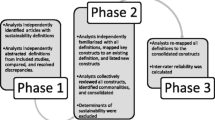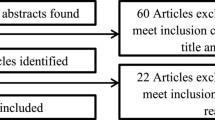Abstract
Fidelity criteria are increasingly used in program monitoring and evaluation, but are difficult to derive for emerging models (i.e., those not based on theory or a research demonstration project). We describe steps used to develop and operationalize fidelity criteria for consumer-run (CR) mental health services: articulating and operationalizing criteria based on published literature, then revising and validating the criteria through expert judgments using a modified Delphi method. Respondents rated highest those structural and process components emphasizing the value of consumerism: consumer control, consumer choices and opportunities for decision-making, voluntary participation (and the absence of coercion), and respect for members by staff.
Similar content being viewed by others
References
Bond, G.R., Drake, R.E., Mueser, K.T., & Becker, D.R. (1997). An update on supported employment for people with severe mental illness. Psychiatric Services, 48(3), 335-346.
Bond, G. R., Evans, L., Salyers, M. P., et al. (2000). Measurement of fidelity in psychiatric rehabilitation. Mental Health Services Research, 2(2), 75-87.
Chamberlain, J., Rogers, E. S., & Ellison, M.L. (1996). Self-help programs: A description of their characteristics and their members. Psychiatric Rehabilitation Journal, 19(3), 33-42.
Clark, C. C., & Krupa, T. (2002). Reflections on empowerment in community mental health: giving shape to an elusive idea. Psychiatric Rehabilitation Journal, 25(4), 341-349.
Donabedian, A. (1980). Exploration in quality assessment and monitoring: The definition of quality and approaches to assessment. Vol I. Ann Arbor, MI: Health Admin. Press.
Drake, R. E., McHugo, G. J., Becker, D. R., et al. (1996). The New Hampshire study of supported employment for people with severe mental illness. Journal of Consulting and Clinical Psychology, 64(2), 391-399.
Hermann, R. C., Finnerty, M., Provost, S., et al. (2002). Process measures for the assessment and improvement of quality of care for schizophrenia. Schizophrenia Bulletin, 28(1), 95-104.
Le Doux, E. (1997). Revitalizing a consumer-controlled alternative. In Mowbray, C.T., Moxley, D.P., Jasper, C.A. & Howell, L.L. (Eds.). Consumers as providers in psychiatric rehabilitation (pp. 142-147). Columbia, Md.: International Association of Psychosocial Rehabilitation Services.
Lucca, A.M. (2000). A Clubhouse fidelity index: Preliminary reliability and validity results. Mental Health Services Research, 2(2), 89-94.
Maton, K.I., & Salem, D.A. (1995). Organizational characteristics of empowering community settings: A multiple case study approach. American Journal of Community Psychology, 23(5), 631-656.
McGrew, J.H., Bond, G.R., Dietaen, L., & Salyers, M. (1994). Measuring the fidelity of implementation of a mental health program model. Journal of Consulting and Clinical Psychology, 62(4), 670-678.
McHugo, G. J., Drake, R. E., Teague, G. B., & Xie, H. (1999). Fidelity to assertive community treatment and client outcomes in the New Hampshire dual disorders study. Psychiatric Services, 50(6), 818-824.
Mead, S., Hilton, D., & Curtis, L. (2001). Peer support: a theoretical perspective. Psychiatric Rehabilitation Journal, 25(2), 134-141.
Mowbray, C.T., Moxley, D.P., Jasper, C., & Howell, L. (Eds.). (1997). Consumers as providers in psychiatric rehabilitation. Columbia, Md.: International Association of Psychosocial Rehabilitation Services.
Mowbray, C.T., & Tan, C. (1992). Evaluation of an innovative consumer-run service model: The Drop-In Center. Innovations & Research, 1(2), 19-24.
Mueser, K.T., Bond, G.R., Drake, R.E., et al. (1998). Models of community care for severe mental illness: A review of research on case management. Schizophrenia Bulletin, 24, 37-74.
Segal, S. P., & Silverman, C. (2002). Determinants of client outcomes in self-help agencies. Psychiatric Services, 53(3), 304-309.
Segal, S.P., Silverman, C., & Temkin, T. (1993). Empowerment and self-help agency practice for people with mental disabilities. Social Work, 38(6), 705-712.
Silverman, S. (1997). Recovery through partnership: "on our own, Charlottesville, Virginia." In Mowbray, C. T., et al., (Eds.). Consumers as providers in psychiatric rehabilitation (pp. 126-141). Columbia, Md.: International Assoc. for Psychosocial Rehabilitation Services.
Solomon, P., & Draine, J. (1996). Perspectives concerning consumers as case managers. Community Mental Health Journal, 32(1), 41-46.
Teague, G.B., Bond, G.R., & Drake, R.E. (1998). Program fidelity in assertive community treatment: Development and use of a measure. American Journal of Orthopsychiatry, 68(2), 216-232.
Teague, G. B., Drake, R. E., & Ackerson, T. H. (1995). Evaluating use of continuous treatment teams for persons with mental illness and substance abuse. Psychiatric Services, 46 (7), 689-695.
Teague, G.B., Ganju, V., Hornik, J.A., et al. (1997). The MHSIP mental health report card. A consumer-oriented approach to monitoring the quality of mental health plans. Evaluation Review, 21 330-341.
Test, M.A. (1998). Community-based treatment models for adults. In Williams, J.B.W. and Ell, K. (Eds.) Advances in mental health research: Implications for practice (pp. 420-436). Silver Springs, MD: NASW Press.
Van Tosh, L., & del Vecchio, P. (2000). Consumer-operated self-help programs: A technical report. Center for Mental Services, SAMHSA, PHS, US-DHHS. Rockville, MD (www.samsha. gov).
Yanos, P. T., Primavera, L. H., & Knight, E. L. (2001). Consumer-run service participation, recovery of social functioning, and the mediating role of psychological factors. Psychiatric Services, 52(4), 493-500.
Zinman, S. (1986). Self-help: The wave of the future. Hospital and Community Psychiatry, 37(3), 213.
Author information
Authors and Affiliations
Rights and permissions
About this article
Cite this article
Holter, M.C., Mowbray, C.T., Bellamy, C.D. et al. Critical Ingredients of Consumer Run Services: Results of a National Survey. Community Ment Health J 40, 47–63 (2004). https://doi.org/10.1023/B:COMH.0000015217.65613.46
Issue Date:
DOI: https://doi.org/10.1023/B:COMH.0000015217.65613.46




